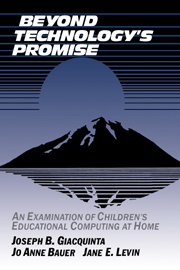Book contents
- Frontmatter
- Contents
- List of Tables and Figures
- Preface
- Chapter 1 THE PROMISE
- Chapter 2 STUDYING THE PROMISE
- Chapter 3 THE ABSENCE OF CHILDREN'S ACADEMIC COMPUTING AT HOME
- Chapter 4 THE AVAILABILITY OF EDUCATIONAL SOFTWARE
- Chapter 5 THE IMPORTANCE OF PARENTAL ENCOURAGEMENT AND ASSISTANCE
- Chapter 6 THE ROLE OF GENDER IN HOME COMPUTER USE
- Chapter 7 SCHOOL USE OF COMPUTERS
- Chapter 8 CHILDREN'S PREFERENCE FOR GAMES
- Chapter 9 REDEFINING A NEW TECHNOLOGY AS A SOCIAL INNOVATION
- Chapter 10 VIEWING TECHNOLOGICAL CHANGE AS A SOCIAL PROCESS
- Chapter 11 REEXAMINING THE HOME-SCHOOL COMPUTER CONNECTION
- Chapter 12 WHERE DO WE GO FROM HERE?
- Appendix A A FURTHER NOTE ON SITE FIELDWORK AND ANALYSIS
- Appendix B LIST OF CODES FOR SITE LOG ANALYSIS
- Appendix C SITE LOG ANALYSIS CODEBOOK
- Appendix D LIST OF FAMILIES AND SCHOOL-AGED CHILDREN
- Appendix E SPECIFIC STEPS FAMILIES MIGHT TAKE
- References
- Index
Chapter 5 - THE IMPORTANCE OF PARENTAL ENCOURAGEMENT AND ASSISTANCE
Published online by Cambridge University Press: 05 March 2012
- Frontmatter
- Contents
- List of Tables and Figures
- Preface
- Chapter 1 THE PROMISE
- Chapter 2 STUDYING THE PROMISE
- Chapter 3 THE ABSENCE OF CHILDREN'S ACADEMIC COMPUTING AT HOME
- Chapter 4 THE AVAILABILITY OF EDUCATIONAL SOFTWARE
- Chapter 5 THE IMPORTANCE OF PARENTAL ENCOURAGEMENT AND ASSISTANCE
- Chapter 6 THE ROLE OF GENDER IN HOME COMPUTER USE
- Chapter 7 SCHOOL USE OF COMPUTERS
- Chapter 8 CHILDREN'S PREFERENCE FOR GAMES
- Chapter 9 REDEFINING A NEW TECHNOLOGY AS A SOCIAL INNOVATION
- Chapter 10 VIEWING TECHNOLOGICAL CHANGE AS A SOCIAL PROCESS
- Chapter 11 REEXAMINING THE HOME-SCHOOL COMPUTER CONNECTION
- Chapter 12 WHERE DO WE GO FROM HERE?
- Appendix A A FURTHER NOTE ON SITE FIELDWORK AND ANALYSIS
- Appendix B LIST OF CODES FOR SITE LOG ANALYSIS
- Appendix C SITE LOG ANALYSIS CODEBOOK
- Appendix D LIST OF FAMILIES AND SCHOOL-AGED CHILDREN
- Appendix E SPECIFIC STEPS FAMILIES MIGHT TAKE
- References
- Index
Summary
While parents frequently recognize the need for their children to be successful in school, they do not realize the critical role they play in their children's academic achievement. Parents often assume that the public school will take the place of the home in effecting their children's growth.
(Snodgrass, 1991, p. 83)The number of purchases of computers and software in the 1980s might suggest that parents were making an important contribution to their children's educational growth. Among the families we studied, however, these actions alone did not lead to academic computing or, for that matter, to other forms of educational computing. Such actions had to be coupled with other conditions, critical among them being parental encouragement and assistance.
In this chapter we focus on the different kinds of educational help that parents can give children at home. In our study, some parents offered help with academic computing occasionally, but most offered none at all. The exceptions we found demonstrate the positive effects encouragement and assistance had on children's computing efforts. We discuss the conditions – including parental unwillingness and lack of skill – that accounted for why parents did not help. At the end of the chapter, we speculate about the presence of these conditions within newer “generations” of computer families.
From the literature on the involvement of parents in their children's educational development, we isolated six important kinds of involvement at home: provisioning, goal setting, praising, modeling, coaching, and scaffolding.
Provisioning refers to behaviors that produce the material necessities of learning. For academic computing, parental provisioning would include ensuring an adequate computer, ancillary hardware, space and furniture, and appropriate software.
- Type
- Chapter
- Information
- Beyond Technology's PromiseAn Examination of Children's Educational Computing at Home, pp. 62 - 79Publisher: Cambridge University PressPrint publication year: 1994



